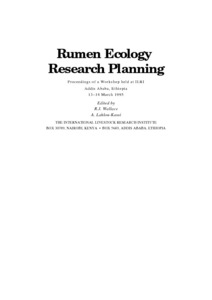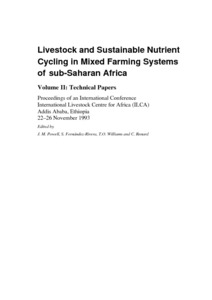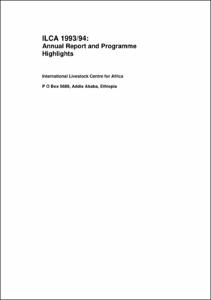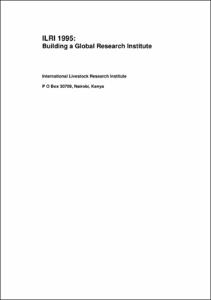Location
Vision, mission and strategy
ILRI's strategy 2013-2022 was approved in December 2012. It emerged from a wide processof consultation and engagement.
ILRI envisions... a world where all people have access to enough food and livelihood options to fulfil their potential.
ILRI’s mission is... to improve food and nutritional security and to reduce poverty in developing countries through research for efficient, safe and sustainable use of livestock—ensuring better lives through livestock.
ILRI’s three strategic objectives are:
- with partners, to develop, test, adapt and promote science-based practices that—being sustainable and scalable—achieve better lives through livestock.
- with partners,to provide compelling scientific evidence in ways that persuade decision-makers—from farms to boardrooms and parliaments—that smarter policies and bigger livestock investments can deliver significant socio-economic, health and environmental dividends to both poor nations and households.
- with partners,to increase capacity among ILRI’s key stakeholders to make better use of livestock science and investments for better lives through livestock.
This is ILRI’s second ten-year strategy. It incorporates a number of changes, many based on learning from the previous strategy (2000–2010, initially produced in 2000 and modified in 2002), an interim strategy (2011–2012) and an assessment of the external and internal environments in which the institute operates.
Members:
Resources
Displaying 956 - 960 of 1152Rumen ecology research planning. Proceedings of a workshop
This workshop was conducted to identify and prioritise areas of rumen ecology which are promising for their potential impact on improving nutrition status of tropical ruminants, to develop a rumen ecology research programme for ILRI based on relevance to developing countries and ILRI's comparative advantage vis-a-vis other institutions, to identify potential collaborators in advanced research institutes, and to define model(s) of collaboration.
Manure utilisation, drought cycles and herd dynamics in the Sahel: implications for cropland productivity
Animal manure is of vital importance to soil-fertility maintenance in semi-arid West Africa due to its intrinsic value as a soil amendment and because of the low level of inorganic fertiliser use. This paper provides a regional overview of manure utilisation for food crop production. Results of experimental trials and on-farm studies are reviewed to evaluate the agronomic and economic effectiveness of livestock manure as a source of nutrients for millet and sorghum production.
Livestock and sustainable nutrient cycling in mixed farming systems of sub-Saharan Africa. Volume II: Technical papers. Proceedings of an international conference
Achieving sustainable increases in agricultural production in sub-Saharan Africa is both a regional and a worldwide concern. High human and animal population densities in some areas have surpassed
land-carrying capacities causing environmental degradation and undermining the long-term stability of these production systems. In attempts to meet the increasing food demands of larger populations,
farmers are cultivating more land permanently, grazing lands have diminished and many traditional farming practices that formerly allowed land to rejuvenate are disappearing.
ILCA 1993/94: Annual report and programme highlights
This report highlights ILCA's work in the past, and discusses current activities and future plans with particular reference to mixed crop-livestock systems, market-oriented smallholder dairying, conservation of biodiversity, biological efficiency of livestock, livestock production under trypanosomiasis risk, livestock and resource management policy, and strengthening national research capacities.






